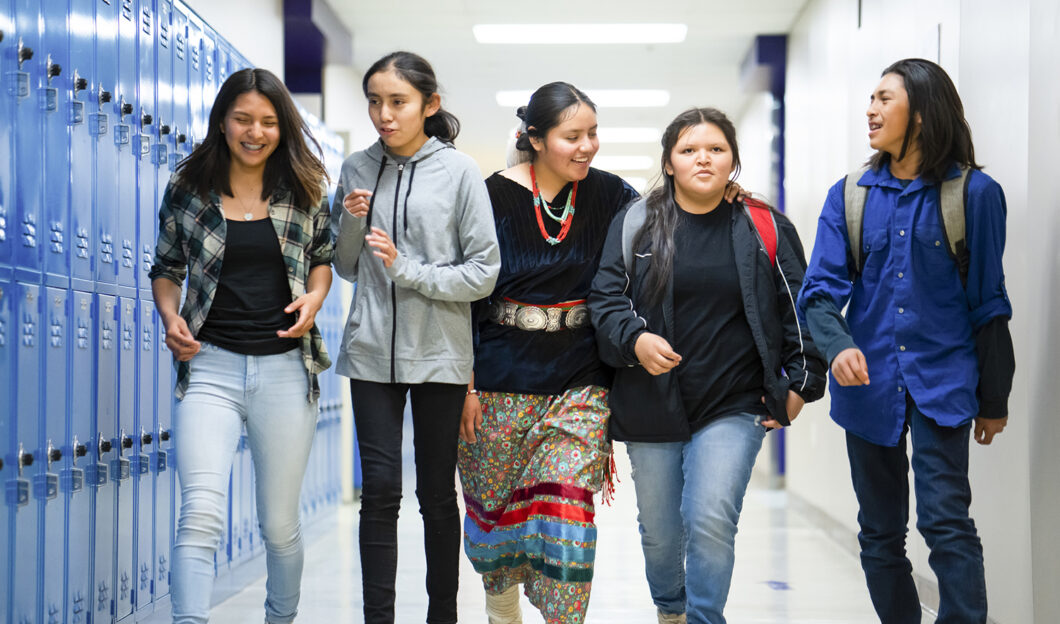Speech-language pathologists (SLPs) work with a wide range of populations, including Indigenous communities—also identified as Native American, American Indian, and Alaska Native. This population holds a great amount of cultural, linguistic, and historical diversity, along with unique languages, traditions, and experiences rooted in centuries of rich heritage. How can we, as future SLPs, provide culturally competent support for Indigenous clients?
Incorporating Indigenous Perspectives
It is important to include materials and approaches that are sensitive to the Indigenous cultures and languages. Narrative-based strategies—like engaging in storytelling interactions, teaching inferencing skills, and discussing narratives—are found to support this population in culturally meaningful ways (Guiberson & Ferris, 2023).
Learn more about current research/practices implementing Indigenous perspectives:
Allison-Burbank, J. D., Conn, A., & Vandever, D. (2023). Interpreting Diné epistemologies and decolonization to improve language and literacy instruction for Diné children. Language, Speech, and Hearing Services in Schools, 54(3), 705–715. https://doi.org/10.1044/2023_LSHSS-22-00147
Guiberson, M., & Ferris, K. P. (2023). Native American caregiver–child shared book reading interactions: A descriptive study and integrative review. Language, Speech, and Hearing Services in Schools, 54(2), 409–424. https://doi.org/10.1044/2022_LSHSS-22-00085
Adopting Strengths-Based Frameworks
Moving away from deficit-focused approaches and instead adopting models, like the Indigenous Connectedness Framework developed by Ullrich (2019), can help SLPs integrate Indigenous culture into their therapy approaches (Allison-Burbank & Reid, 2023). By embracing these frameworks, SLPs can draw on the strengths and interconnectedness of Indigenous traditions, leading to more impactful and meaningful support.
Learn more about strengths-based frameworks that embrace Indigenous connections and traditions:
Allison-Burbank, J. D., & Reid, T. (2023). Prioritizing connectedness and equity in speech-language services for American Indian and Alaska Native children. Language, Speech, and Hearing Services in Schools, 54(2), 368–374. https://doi.org/10.1044/2022_LSHSS-22-00101
Ullrich, J. S. (2019). For the love of our children: An Indigenous connectedness framework. AlterNative: An International Journal of Indigenous Peoples, 15(2), 121–130. https://doi.org/10.1177/1177180119828114
Continuing Cultural Humility and Awareness
SLPs should continuously develop their cultural humility by practicing self-reflection, acknowledging the impacts of historical trauma on Indigenous communities, and fostering relationships with mutual respect. Cultural humility requires lifelong learning and appreciation for multicultural knowledge. Resources developed by ASHA—such as ASHA’s Cultural Competence Check-Ins and That’s Unheard Of —can further support students and clinicians in their journey toward cultural competence and humility.
Learn more about how clinicians are incorporating culturally responsive services:
Guiberson, M., & Ferris, K. (2023). Speech-language pathologists’ preparation, practices, and perspectives on serving Indigenous families and children. American Journal of Speech-Language Pathology, 32(6), 2858–2870. https://doi.org/10.1044/2023_AJSLP-23-00105
Vining, C., Long, E., Inglebret, E., & Brendal, M. (2017). Speech-language assessment considerations for American Indian and Alaska Native children who are dual language learners. Perspectives of the ASHA Special Interest Groups, 2(14), 29–40. https://doi.org/10.1044/persp2.SIG14.29
Meeks, J. C. (2023). Native American speech-language pathology assistants: Expanding culturally responsive services in reservation schools. Language, Speech, and Hearing Services in Schools, 54(2), 395–408. https://doi.org/10.1044/2022_LSHSS-22-00081

